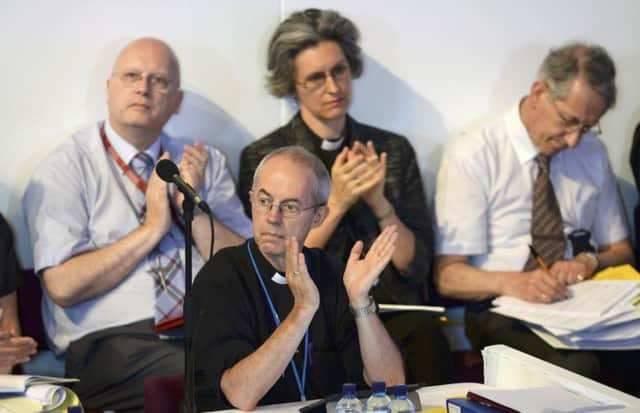Women bishops to be appointed in Church of England


Two years ago, a similar proposal failed narrowly due to opposition from traditionalist lay members, to the dismay of modernisers, the Church hierarchy and politicians.
But after a five-hour debate yesterday, the Church’s General Synod voted overwhelmingly in favour of an amended plan at its meeting in York.
Advertisement
Hide AdAdvertisement
Hide Ad“Today is the completion of what was begun over 20 years ago with the ordination of women as priests. I am delighted with today’s result,” said the Anglican leader, the Archbishop of Canterbury Justin Welby.
“Today marks the start of a great adventure of seeking mutual flourishing while still, in some cases, disagreeing.”
He said the first female bishop could be named early next year.
Desmond Tutu, the retired archbishop of Cape Town, was more succinct. He texted: “God be praised. Yippee!”
The issue over women bishops has caused internal division since the Synod approved female priests in 1992.
It has pitted reformers, keen to project a more modern image of the Church as it struggles with falling congregations in many increasingly secular countries, against a conservative minority which says the change contradicts the Bible.
However, the reaction in the Synod yesterday was one of jubilation, with members were seen hugging and cheering as they left the chamber.
The Rev Dr Rosemarie Mallet, from Southwark diocese, said: “I’m absolutely joyful. Thank God after 20 years of very hard work we now have a decision that can help us work for everyone in the Church and engage everybody to be part of that ministry.
Advertisement
Hide AdAdvertisement
Hide Ad“Over the past year or so the Church has been growing in its work in the community, through credit unions and food banks, but people didn’t think we got it because at the heart of it we weren’t engaging everyone and saying our women are as good as our men.”
The Right Rev David Walker, Bishop of Manchester, said: “I’m really very emotional at the moment, it’s been a long time coming and it’s been achieved by such an overwhelming majority as we had to get two thirds of each house but we had over three quarters and that’s a huge vote of confidence in the work we have done to get it through.”
“An enormous amount of work has had to take place to get us to where we are today, particularly in the last two years after the first attempt failed. This legislation was much simpler and we’ve been working on human relationships to sort out our problems.”
Simon Killwick, chairman of the Synod’s Catholic Group, which opposed the move, said: “While we are deeply concerned about the consequences for the wider unity of the Church, we remain committed to working together with all to further the mission of the Church to the nation.”
TIMELINE
1975: General Synod votes that there is “no fundamental objection” to the ordination of women to the priesthood.
1978: A motion to bring forward legislation to remove the barriers to the ordination of women to the priesthood and their consecration as bishops fails at General Synod.
1985: General Synod votes to allow women to become deacons.
1987: First women deacons are ordained in the Church of England.
1992: General Synod votes to permit women to be ordained in the priesthood.
1994: 1,500 women deacons ordained as priests.
Advertisement
Hide AdAdvertisement
Hide Ad2005: The process of removing the legal obstacles to women as bishops is approved.
2011: 42 out of 44 dioceses approve draft legislation to introduce women bishops.
2012: The legislation fails by just six votes in the House of Laity at the General Synod.
2013: Conflict resolution experts are called in to help opposing groups resolve their differences.
2014: General Synod finally votes in favour of legislation introducing women bishops.